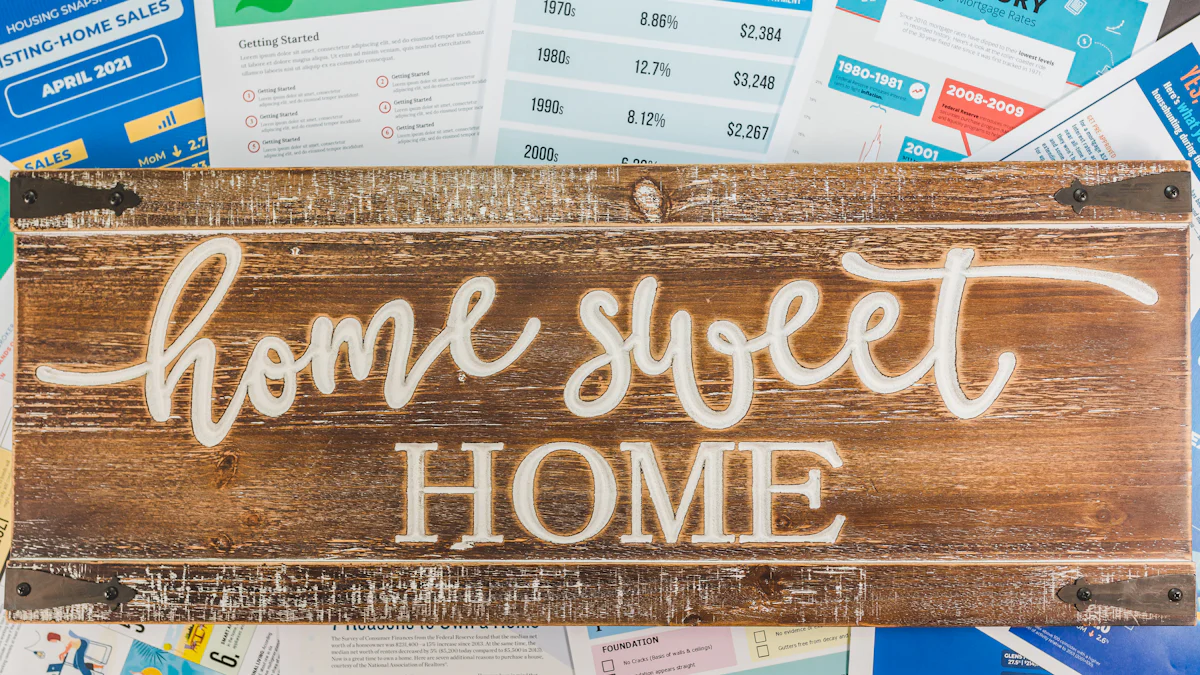The Secret to Paying Off Your Mortgage Early

Paying off your mortgage early might seem like a daunting goal, but it’s more achievable than you think. By making consistent extra payments, you can save thousands of dollars in interest and shave years off your loan term. For example, switching to biweekly payments instead of monthly ones can reduce a 30-year mortgage to just 23 years. Even small changes, like applying windfalls—bonuses or tax refunds—toward your principal, can make a big difference. Imagine saving over $22,000 in interest just by paying 10% more each month. These strategies not only help you pay off mortgage early but also bring you closer to financial freedom.
Key Takeaways
Paying off your mortgage early helps you save on interest. Extra payments lower your loan balance, saving you money over time.
You can gain financial freedom by paying off your mortgage. This lets you use money for retirement, trips, or other goals.
Use extra money like bonuses or tax refunds to pay more. Even small payments can help you pay off faster.
Try making biweekly payments instead of monthly ones. This adds one extra payment yearly, cutting your loan time and interest.
Set small goals to stay motivated. Celebrate each step to stay focused on paying off your mortgage early.
Benefits of Paying Off Your Mortgage Early

Save Money on Interest Payments
One of the biggest perks of paying off your mortgage early is the money you save on interest. Mortgages are long-term loans, and over the years, interest can add up to tens of thousands of dollars. By making extra payments, you reduce the principal balance faster. This means less interest accrues over time. For example, if you pay just one extra payment each year, you could save thousands in interest and shorten your loan term by several years. That’s money you can keep in your pocket instead of giving it to the bank.
Achieve Financial Independence
Imagine the freedom of living without a mortgage payment. Paying off your mortgage early gives you that independence. Once your home is paid off, you can redirect your money toward other goals. Whether it’s saving for retirement, traveling the world, or investing in your future, the possibilities are endless.
Paying off your mortgage early not only provides financial relief but also gives you the freedom to allocate your resources towards other important life goals, such as retirement savings, travel, or investments.
This financial independence allows you to take control of your money and focus on what truly matters to you.
Reduce Financial Stress and Anxiety
Carrying a mortgage can feel like a heavy weight on your shoulders. Paying it off early can ease that burden and bring peace of mind. You’ll no longer worry about monthly payments or interest rates. Instead, you’ll enjoy the security of owning your home outright.
Here are some of the psychological benefits of paying off your mortgage early:
It leads to better overall health.
It has a direct effect on self-esteem and general well-being.
When you’re not stressed about your mortgage, you can focus on other aspects of your life. This can improve your mental and physical health, making you feel more confident and secure.
Free Up Cash for Future Goals
Paying off your mortgage early doesn’t just save you money—it also opens up exciting opportunities for your future. Once that monthly payment is off your plate, you’ll have extra cash to put toward the things that matter most to you. What could you do with that freed-up money? The possibilities are endless.
Here are a few ideas to inspire you:
Boost your retirement savings: Contribute more to your 401(k) or IRA. The earlier you invest, the more time your money has to grow.
Start a college fund: If you have kids, you can set aside money for their education. This reduces the need for student loans later.
Pursue your passions: Always wanted to start a business, learn a new skill, or travel the world? Now you can use that extra cash to make it happen.
Build an emergency fund: Life is unpredictable. Having a solid financial cushion can give you peace of mind when unexpected expenses arise.
💡 Tip: Create a list of your top financial goals. Once your mortgage is paid off, decide how to allocate your extra funds to achieve those goals faster.
Think about how much more flexibility you’ll have. Without a mortgage, you can focus on building wealth, whether that’s through investments, real estate, or other ventures. You’ll also have the freedom to enjoy life more—whether it’s taking that dream vacation or simply having more financial security.
By paying off your mortgage early, you’re not just eliminating debt. You’re creating opportunities to live the life you’ve always envisioned. What will you do with your newfound financial freedom?
Key Strategies for Paying Off Your Mortgage

Make Biweekly Payments
Switching to biweekly payments is one of the simplest early mortgage payoff strategies. Instead of making one monthly payment, you split it in half and pay every two weeks. This small change adds up over time. By the end of the year, you’ll have made 13 full payments instead of 12. That extra payment goes directly toward your principal, helping you pay off your mortgage faster.
"Paying half the monthly mortgage payment every two weeks effectively makes 13 full monthly payments per year rather than 12. The extra payment goes directly to the principal."
Here’s how it works:
You’ll reduce your loan term and save on interest costs.
For a $400,000 mortgage at 5% interest, biweekly payments could shorten a 30-year loan by nearly five years.
You could save over $69,000 in interest without refinancing.
This strategy doesn’t require a big financial commitment. It’s a simple adjustment that can make a huge difference in the long run.
Increase Monthly Payments
Another effective way to pay off your mortgage early is by increasing your monthly payments. Even a small increase can have a big impact. For example, adding just 10% to your monthly payment can save you thousands in interest and cut years off your loan term. The extra money goes straight to your principal, reducing the amount of interest you’ll pay over time.
If you’re unsure how much extra to pay, start small. Add $50 or $100 to your payment each month. As your income grows, you can increase this amount. The key is consistency. Over time, these extra payments will add up and help you achieve your goal of paying off your mortgage.
💡 Tip: Check with your lender to ensure your extra payments are applied to the principal, not future interest.
Use Windfalls to Pay Down Principal
Windfalls—like bonuses, tax refunds, or unexpected gifts—are perfect for making extra mortgage payments. Instead of spending that money, apply it directly to your loan’s principal. This reduces your balance and the interest you’ll pay over the life of the loan.
For example, let’s say you receive a $5,000 bonus. If you apply it to your mortgage, you’ll not only lower your balance but also save on interest. Over time, these occasional lump-sum payments can significantly shorten your loan term.
💡 Tip: Set a goal to use at least 50% of any windfall for paying off your mortgage. The rest can go toward other financial goals or fun activities.
Using windfalls is a flexible strategy. You don’t need to commit to a fixed amount each month. Instead, you can take advantage of extra funds whenever they come your way. It’s a great way to accelerate your progress without straining your budget.
Refinance to a Shorter Loan Term
Refinancing to a shorter loan term is a powerful way to pay off your mortgage early. By switching from a 30-year loan to a 15- or 20-year loan, you can significantly reduce the time it takes to own your home outright. Shorter loan terms often come with lower interest rates, which means you’ll save money in the long run.
Here’s why this strategy works:
Lower interest rates: Shorter loans typically have better rates, so more of your payment goes toward the principal.
Faster payoff: You’ll cut years off your mortgage, helping you achieve financial freedom sooner.
Big savings: Over the life of the loan, you’ll pay much less in interest.
For example, refinancing a $300,000 mortgage from a 30-year term at 6% to a 15-year term at 5% could save you over $100,000 in interest. That’s a huge win for your wallet!
💡 Tip: Before refinancing, check if the closing costs and fees make sense for your budget. Use an online mortgage calculator to see how much you’ll save.
Refinancing does mean higher monthly payments, but the long-term benefits are worth it. If you can afford the increase, this strategy can fast-track your journey to a debt-free home.
Cut Expenses and Redirect Savings
Cutting expenses is one of the simplest ways to free up extra cash for your mortgage. By trimming unnecessary spending, you can redirect those savings toward your loan’s principal. Every dollar counts when you’re working to pay off your mortgage early.
Start by reviewing your budget. Look for areas where you can cut back:
Dining out: Cook at home more often.
Subscriptions: Cancel services you rarely use.
Utilities: Save energy by turning off lights and using energy-efficient appliances.
Shopping: Avoid impulse buys and stick to a list.
Even small changes can add up. For example, saving $200 a month by cutting expenses could mean an extra $2,400 a year toward your mortgage. Over time, this can shave years off your loan term.
💡 Tip: Automate your extra payments. Once you save money, set up an automatic transfer to your mortgage account. This ensures you stay consistent.
Think of it this way: Every dollar you save and apply to your mortgage brings you closer to financial freedom. It’s a simple yet effective strategy that anyone can use.
Make One Extra Payment Annually
Making one extra payment each year is another easy way to pay off your mortgage faster. This strategy works because the extra payment goes directly toward your principal, reducing the amount of interest you’ll pay over time.
Here’s how to do it:
Save a little each month. Divide your monthly payment by 12 and set that amount aside. By the end of the year, you’ll have enough for an extra payment.
Use bonuses or tax refunds. Apply these windfalls to your mortgage as your annual extra payment.
For example, if your monthly payment is $1,500, saving $125 a month will give you an extra $1,500 by year’s end. Over time, this can save you thousands in interest and cut years off your loan.
💡 Tip: Check with your lender to ensure the extra payment is applied to the principal, not future interest.
This strategy is flexible and doesn’t require a big financial commitment. It’s a great option if you want to make progress without overhauling your budget. One extra payment a year might not seem like much, but it can make a huge difference in the long run.
Overcoming Challenges When You Pay Off Mortgage Early
Managing Budget Constraints
Paying off your mortgage early can feel overwhelming if your budget is tight. But with a little planning, you can make it work. Start by reviewing your monthly expenses. Look for areas where you can cut back, like dining out or unused subscriptions. Even small changes can free up extra cash for your mortgage payments.
Another helpful strategy is creating a realistic budget. Allocate a specific amount each month toward your mortgage. This keeps you on track without stretching your finances too thin. If unexpected expenses arise, adjust your plan temporarily but stay committed to your goal.
💡 Tip: Automate your extra payments. This ensures consistency and removes the temptation to spend the money elsewhere.
Balancing Opportunity Costs
When deciding to pay off your mortgage early, it’s important to weigh the opportunity costs. Could that extra money be better used elsewhere? For example:
If your mortgage interest rate is low, investing in stocks or retirement accounts might yield higher returns.
Paying off your mortgage means those funds won’t be available for emergencies or other financial goals.
Consider your future cash needs. If you anticipate big expenses, like college tuition or medical bills, it might be wise to keep some money accessible.
Evaluate your options carefully. If your investments can outperform your mortgage interest rate, it may make sense to split your funds between paying off the loan and investing. This way, you can grow your wealth while reducing debt.
Staying Motivated Over the Long Term
Paying off your mortgage early is a marathon, not a sprint. Staying motivated can be tough, but there are ways to keep your momentum. Start by setting small, achievable milestones. Celebrate when you reach them—whether it’s paying off $10,000 or completing one extra payment.
Use windfalls like bonuses or tax refunds to make extra payments. Seeing your balance drop faster can be incredibly motivating. Biweekly payments are another great option. They help you make progress without feeling like a huge financial burden.
💡 Tip: Keep an emergency fund. Knowing you have a safety net can reduce stress and help you stay focused on your goal.
If possible, find ways to increase your income. A side hustle or freelance work can provide extra cash to apply toward your mortgage. Remember, every little bit helps. By staying consistent and celebrating your progress, you’ll stay motivated and reach your goal faster.
Avoiding Prepayment Penalties
Paying off your mortgage early sounds great, right? But before you start making extra payments, check if your loan has a prepayment penalty. Some lenders charge this fee if you pay off your mortgage ahead of schedule. It’s their way of recouping the interest they lose when you pay early. These penalties can cost you thousands, so it’s important to know how to avoid them.
First, review your loan agreement. Look for terms like "prepayment penalty" or "early payoff fee." If you’re unsure, ask your lender directly. Knowing the rules upfront can save you from unexpected costs.
💡 Tip: If you’re shopping for a mortgage, choose one without a prepayment penalty. Many lenders offer penalty-free options, so don’t settle for less.
If your loan does have a penalty, don’t worry. You still have options. Some penalties only apply during the first few years of the loan. Check if your penalty period has expired. If it hasn’t, focus on saving or investing your extra cash until you can pay without a fee.
Another strategy is negotiating with your lender. Some lenders may waive the penalty if you explain your financial goals. It never hurts to ask!
Finally, consider refinancing. If you’re stuck with a loan that has a hefty penalty, refinancing to a better loan could save you money in the long run. Just make sure the new loan doesn’t come with its own prepayment penalty.
By understanding and planning around prepayment penalties, you can avoid unnecessary fees and stay on track to pay off your mortgage early. Always read the fine print and explore your options. You’ve got this!
Paying off your mortgage early doesn’t have to feel overwhelming. By using strategies like biweekly payments, increasing monthly contributions, and applying windfalls, you can make steady progress. Refinancing to a shorter loan term or cutting unnecessary expenses can also help you redirect funds toward your principal. Even small steps, like making one extra payment annually, can lead to big savings over time.
The benefits go beyond financial. You’ll save thousands in interest, reduce stress, and gain the freedom to focus on other goals. Imagine the peace of mind that comes with owning your home outright. Studies even show that eliminating mortgage debt can boost happiness and optimism.
So, why wait? Start today by analyzing your budget, setting realistic goals, and automating extra payments. Celebrate milestones along the way to stay motivated. With consistency and determination, you’ll achieve mortgage freedom faster than you think.
See Also
Starting Your Personal Finances Early Is Always Beneficial
Daily Routines That Lead to Financial Success
January Mortgage Trends Indicate Lower Rates This Year
Will 2025 Be the Right Time for Housing Investments?
Essential Information on 2025 Interest Rates for Cardholders

